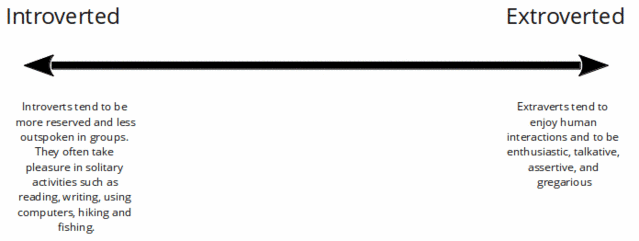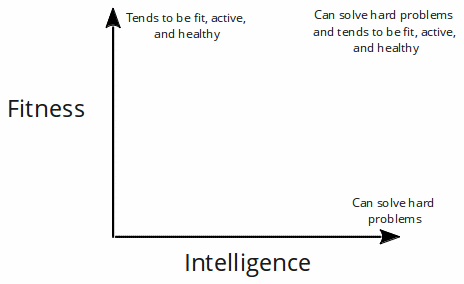Extroversion
Introversion Is Not the Opposite of Extroversion: Part I
Part 1: What if what we learned about these traits was wrong?
Posted June 2, 2020 Reviewed by Hara Estroff Marano
Here is a common belief about introversion and extroversion. I intend to show how it worsens your life and offer an alternative. You might resist and fight the alternative, but if you keep an open mind, I predict that it helps explain your world and improve your life.

I call it the “Or” model of introversion and extroversion for reasons you'll see. It says that introverted people have certain properties and abilities, extroverted people have others, and that you have one set or the other, but not both. You may lie in the middle, partly introverted and partly extroverted, but not fully either. People commonly believe it, but it has no tangible existence.
As George Box said,
All models are wrong, but some are useful.
Still, when someone believes it, it influences them and, to the extent they don’t realize it’s a belief, it becomes part of the reality they fight to hold.
As Einstein said,
Whether you can observe a thing or not depends on the theory which you use. It is the theory which decides what can be observed.
Today’s post will another model and to see where it leads.
Believing something leads to a cascade of results. For example, confirmation bias will lead you to accept information supporting your belief and reject what contradicts it. If you believe Pat is a great person, when Pat acts great, you think “Pat sure is great” and when Pat acts like a jerk you think “That’s odd, Pat is normally great but just acted like a jerk. Well, Pat’s still great despite this anomaly.” Someone who believed Pat a jerk would think the opposite. That is, confirmation bias leads the same information reinforcing contradictory beliefs.
Believing the Or model will lead you to believe that you, and everyone, fall along the axis. If you believe yourself introverted you’ll feel more comfortable alone, with less energy to do extroverted things. If you believe you’re extroverted you’ll feel more comfortable in groups, with less energy to do introverted things.
Most important, you'll believe the Or model is right and alternatives are wrong. You might not see alternatives. The longer you’ve believed it, the longer you've confirmed it. You’ve create a lifestyle partly based on it. You'll believe that deviating from it will risk loss of rewards you've built your life around.
Why the Or model hurts you
Here is another similar model that you’ll probably recognize as counterproductive. I call it an Or model, too.

Psychology Today readers will not take this model seriously. It suggests people can be fit or intelligent but not both. You can easily tell its consequences to someone who believed it. You’d never want your child to believe it because it would risk your child limiting him- or herself from being fit and intelligent.
You know people can be fit or not and intelligent or not—the measures are independent. If you want to increase your fitness you know you can, say through exercise or diet. Those things won’t decrease your intelligence—and may increase it. Likewise, you can increase your ability to solve problems, say, by solving problems and sleeping well. They won’t decrease your fitness and may increase it.
Still, you probably once believed that the smart kids in school were less fit and the jocks were less smart, or something like that. If you didn’t, some kids did. You probably expect that some adults still believe in an Or model. If so, you probably consider their belief tragic, leading them to believe they have to sacrifice health for intelligence and vice versa.
Even if you don’t believe it, you probably admit to some correlation supporting it, however much you disagree with it. For example, athleticism probably anti-correlates somewhat with high grades. But you wouldn’t say one caused the other so much as, maybe, social customs caused it..
You probably believe something more like what I call the And model.

This model says that fitness and intelligence are independent, that fitness doesn’t imply low intelligence or vice versa. You can be fit and intelligent. People who believe this model reject that fitness lowers intelligence or intelligence lowers fitness. You’d more likely teach it to kids, hoping to motivate them to fitness and intelligence, discouraging them from fearing choosing one and losing the other.
You’d also expect people who believed the Or model would resist teaching kids this model for fear that in trying for both, they might unwittingly sacrifice some of the one they valued.
Fatigue and undeveloped skills
Say you believed the Or model and considered yourself intelligent. You would then consider fitness more challenging than for most. You’d recognize you could become more fit, but you’d believe you had to work harder than fit people. You’d figure exercise was harder for you than for others. You wouldn’t find it relaxing. You’d believe others found it exhilarating and maybe wish you could too.
You’d say exercise drained you of energy and reading relaxed you.
If you believed the And model and heard someone else describe themselves that way, you’d say, “Exercise may tire you for using up your energy, but it does that with everyone. The fatigue can also feel relaxing if you look at it that way. Exercise is hard for everyone. You don’t feel more tired than others after exercise. You only think you feel more tired because of your belief. Change your belief and you’ll see you’re just as capable of enjoying exercising as anyone.”
You can likewise imagine a fit person believing the Or model finding problem-solving drains their energy, and exercise as invigorating and relaxing. You’d say something similar to them about their finding problem-solving draining. Of course it’s hard, but it’s hard for everyone. You only think it’s particularly hard and draining because of your belief.
For every fit intelligent person you showed them, they’d show you a fit underachiever or unfit intelligent person. You’d recognize their confirmation bias in action.
All skills you don’t have feel draining to use until you develop them. After you develop them, they don’t drain you. Feeling drained results from inexperience.
We’ll see this effect again in part 2 of this series. You can counter feeling drained by developing skills, with practice, just like everyone else. If we spend all our time in one area, we won’t reach our potential in another, but that doesn’t mean we can't. It just means we spent more time in one area than another. If your child said playing sports limited their intelligence, you’d disagree.




